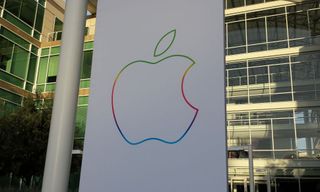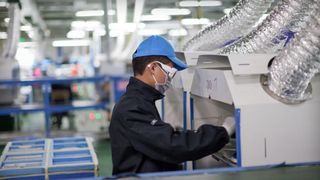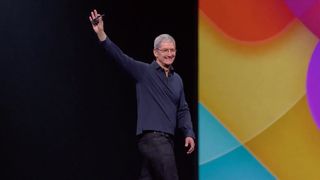How Apple handles leaks, according to a leaked internal briefing
Oops

Leaks are an issue for every major tech company, and Apple is no exception. This includes, ironically enough, a leaked audio recording of an internal briefing about leaks.
The Outline obtained the recording and published details of the briefing. Held earlier this month, the hour-long presentation was dubbed "Stopping Leakers - Keeping Confidential at Apple."
Three of Apple's major security players ran the meeting: David Rice, Director of Global Security, Lee Freedman, Director of Worldwide Investigations, and Jenny Hubbert, a member of the Global Security communications and training team. According to The Outline, this was the first of many such briefings planned for employees.
During the briefing, the trio details a number of tactics Apple employs to handle leaks, as well as the challenge of keeping its new products and services secret. Pervading all of this is a message on the core importance of secrecy to Apple as a company.
Plugging the leaks
Apple employs a number of tactics to stop leaks, including an investigation team called the New Product Security team, which exists within the Global Security group that's led by Rice.
Before heading up the group, Rice worked for the US National Security Agency (NSA) and as a cryptologist for the US Navy.
Apple's factory supply chain used to be the main source of headline-grabbing leaks, according to Rice. Workers would steal parts for new products, and either pass them on to press or sell them on the black market.
Get the best Black Friday deals direct to your inbox, plus news, reviews, and more.
Sign up to be the first to know about unmissable Black Friday deals on top tech, plus get all your favorite TechRadar content.
The price for stolen parts, especially housings or enclosures which serve as tell-tale markers of whatever new product Apple is working on, can be three-months' salary or more.
Apple's efforts to clamp down on supply chain leaks have largely been successful, Rice says. This is apparently due, at least in part, to heightened screenings that Rice claims handle more volume than the US Transportation Security Administration (TSA).
The daily average for Apple factory screenings is 2.7 million versus the TSA's 1.8 million, Rice says. When a new Apple product enters production, the number of daily screenings jumps to three million.

Though there's been a significant decrease in the number of leaks originating from overseas factories, Apple has seen the main source of leaks shift to its US offices. Last year was the first time more leaks came out of Apple's California campuses than overseas, Rice says.
Some of the measures Apple takes to address leaks on its campuses include bringing members of its Secrecy Program Management group into teams working on new products. Details of this practice are sketchy, but it sounds like these embedded members essentially guide employees through keeping what they're working on a secret.
In the event of a leak, an investigation is launched to uncover the source. While some past leakers have been disgruntled employees, that's not always the case. Instead, workers who are genuinely excited to work at Apple and are enthused about what they're working on can share too much, or don't know when to say they can't discuss something.
For the security experts leading the briefing, secrecy and discretion are tantamount to keeping leaks at bay. This includes not discussing what employees are working on with family members or in common areas such as the hallways and lobbies at Apple offices.
Employees are free to discuss topics like a crummy boss or how much their salary is with non-employees, but completely off-limits topics are products or services that haven't come to market and information on when products will go on sale.
If employees are concerned they've "broken secrecy," they're encouraged to let someone know rather than try to cover it up.
TechRadar has asked Apple about the authenticity of the leaked briefing recording and for comment on how it handles leaks. We'll update this story if we hear back.
Keeping the mystique
As described by the presenters and those in videos shown in the briefing, leaks demystify Apple's new product and service releases. The impact of the famous "one more thing" reveal at the end of the company's major events is lessened when consumers know about the product ahead of time.
"So, you heard Tim say, 'We have one more thing.' So, what is that one more thing?" poses Hubbert, the Global Security communications and training team member, in the recording, referring to Apple CEO Tim Cook.
"Surprise and delight," she continues. "Surprise and delight when we announce a product to the world that hasn't leaked. It's incredibly impactful, in a really positive way. It's our DNA. It's our brand. But when leaks get out, that's even more impactful. It's a direct hit to all of us."

Apple is famous for its secrecy, but in recent years, leaks, as with many other companies, have all but announced a product before it's officially unveiled on a keynote stage.
Cook has apparently put a major focus on increasing secrecy – one person in a video says "This has become a big deal for Tim" – and the efforts extend to getting all employees on board with keeping what they're working on behind a carefully guarded veil. Secrecy was also hugely important to Apple co-founder Steve Jobs, who passed away in 2011.
For Apple, the impact of leaks has extended beyond spoiling "surprise and delight" and to the company's sales figures. Cook admitted during Apple's earnings call in May there's a "pause in purchases on iPhone, which we believe are due to the earlier and much more frequent reports about future iPhones."
He's referring to the iPhone 8, set to launch in September this year. While there haven't been major leaks to the level of 2011's iPhone 4 prototype left in a bar, plenty of details have emerged that are keeping consumers from buying the current-gen iPhone 7 and iPhone 7 Plus.
Will Apple's push for secrecy keep further details of the iPhone 8 from leaking before its official reveal? We've got a few months before we find out.
- iPhone 8 rival alert: Here's what we know about the Galaxy Note 8
Michelle was previously a news editor at TechRadar, leading consumer tech news and reviews. Michelle is now a Content Strategist at Facebook. A versatile, highly effective content writer and skilled editor with a keen eye for detail, Michelle is a collaborative problem solver and covered everything from smartwatches and microprocessors to VR and self-driving cars.
Most Popular

